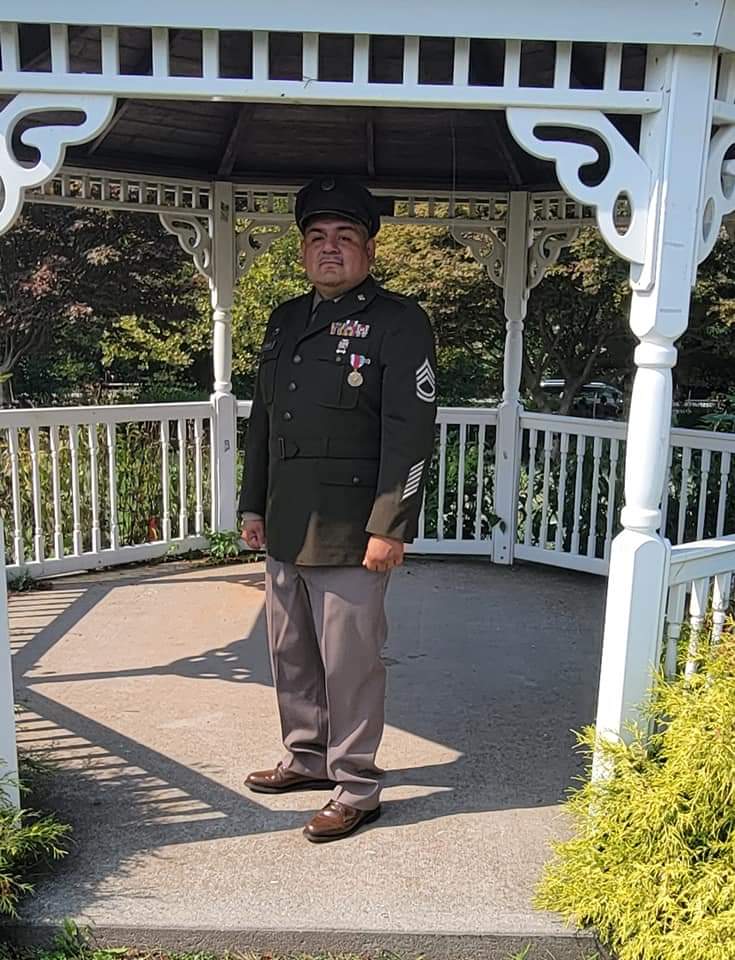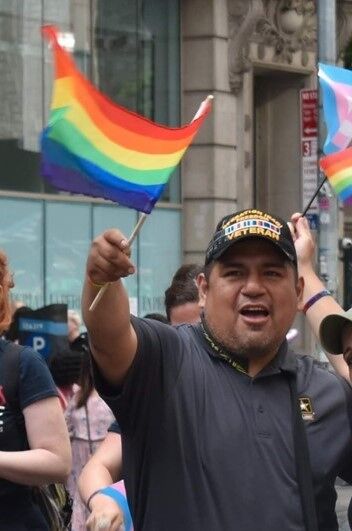Gay military veteran accuses NYPD of years ongoing homophobic harassment
C.J.*, a volunteer with the New York Police Department’s (NYPD) Auxiliary Officer program, says fellow officers and supervisors subjected him to homophobic harassment, including an off-duty assault, vandalism of his departmental locker, and retaliation for complaining about how he was being treated.
Officers in the NYPD’s auxiliary program supplement the regular police force and perform limited duties like foot patrolling, traffic, and parade control. Auxiliary officers get a uniform and a modified badge and aren’t given a gun, pepper spray, or allowed to arrest anyone. Auxiliary officers can also join “special units” that patrol specific transport areas like the subways, highways, or ports.
C.J. moved from Dallas, Texas to New York City in 2012. He worked a full-time job and began volunteering for the NYPD’s auxiliary unit that same year. But because of his negative experiences in the military, he hadn’t planned on coming out in the NYPD.
However, in 2014 the coordinating officer of his auxiliary unit informed Jimenez that his fellow officers all knew he was gay. C.J. didn’t know how they found out or who began telling others, but the outing made him feel very uncomfortable. He decided he wouldn’t “broadcast” his homosexuality at the department, but he could sense that others were gossiping about it.
C.J. told LGBTQ Nation that he endured a lot of mistreatment in the military because of his perceived sexual orientation. He served in the U.S. Army from January 2000 to January 2005, joined the U.S. Army Reserves in 2007, and served in Iraq from 2008 to 2009.
At the time, he didn’t report his mistreatment to his superior officers for fear of being forcibly discharged under “Don’t Ask, Don’t Tell,” the U.S. military ban on homosexual service members. He retired from the reserves as a Sergeant First Class in June 2022.
However, his old fears about homophobic mistreatment materialized in October 2014 when fellow Auxiliary Officer David Jones* allegedly assaulted him while off-duty. C.J. already disliked Officer Jones, seeing him as a narcissist whom he never saw eye-to-eye with. While the two were being driven from a Halloween party, they got into a drunken verbal argument.
Jones began yelling and belittling C.J., to which C.J. responded, “You’re just pissed off because I’m gay and I have more balls than you, and you haven’t been in Iraq.”
When C.J. exited the vehicle to take a subway home, Jones allegedly shoved him out of the car onto the ground, began kicking and choking him, and called him a “wetb**k,” a “queer,” and a “dirty fa***t.” C.J. said he felt stunned and surprised to see Jones’ “true colors.”
The attack didn’t leave C.J. with any serious injuries, but he felt emotionally shaken. Despite this, he didn’t report the attack because it happened off-duty and because he thought things at the NYPD would be better if he didn’t.

In 2015, Jones was transferred to a special auxiliary unit. In November of that same year, C.J. asked Sergeant John Smith*, the coordinator overseeing all auxiliary special units, for a transfer to another special unit patrolling the borough of Queens. C.J. spoke with that unit’s coordinator, Sergeant Tim Jackson*, and went on rides with two unit sergeants who seemed to like him.
But by February 2016, neither Smith nor Jackson had returned C.J.’s calls asking about his transfer. “At that point, I began to realize something wasn’t right,” C.J. told LGBTQ Nation.
By July 2016, C.J. spoke with Detective Robert Brown*, an officer overseeing the special unit Jones had transferred to. C.J. confided about the assault, and Brown reportedly told him that Smith and Jackson weren’t processing his transfer request because he didn’t get along with Jones.
Tired of the stonewalling and mistreatment, C.J. reported Jones’ assault to NYPD Internal Affairs in October 2016. Nine months later, in July 2017, C.J. tried filing another transfer request to the special unit where Jones no longer worked. Brown, the unit head, seemed reluctant to accept C.J.’s transfer request, C.J. said.
In November of that year, C.J. filed a complaint with the NYPD’s Equal Opportunity (EO) office about the lack of responses to his transfer requests. In response, Smith then allegedly ordered C.J. not to contact him or anyone in auxiliary special units anymore. C.J. felt that his order was a retaliation for filing a complaint.
In June 2018, C.J. filed a complaint with the New York State Division of Human Rights that he was being retaliated against for his EO complaint. However, C.J. didn’t pursue it because he couldn’t afford a lawyer.
C.J. unsuccessfully filed another transfer request in October 2018. He then filed a Human Rights complaint with the City of New York in September 2019 to address the ongoing stonewalling. The COVID-19 shutdowns of 2020 delayed any handling of his complaint, and it was administratively dismissed in September 2021. Yet again, C.J. chose not to pursue the matter because he couldn’t afford a lawyer.

Despite the stonewalling, C.J. continued volunteering with the auxiliary program. However, in December 2020, someone broke into his departmental locker, cutting the lock with bolt cutters. Whoever had broken in had removed his duty belt, baton, flashlight, uniform cap, road guard vest, tie, and other various uniform items that he kept in a blue IKEA bag. The vandal hadn’t touched any items belonging to his locker mate. He later found what he believes to be his broken lock on top of the lockers while deep cleaning the area in May 2023.
“I was hesitant to say anything because I was burned out,” he told LGBTQ Nation. He felt like he had been targeted for filing complaints and that no one would really care or do anything about the locker break-in. He alerted the EO office about the vandalism, but nothing came of it, just as nothing came of his repeated transfer requests, the most recent of which he filed in late 2023. C.J. says his transfers seem to keep disappearing with no explanation.
C.J. says he has had no disciplinary actions filed against him for any misconduct on the force, meaning that his on-duty behavior doesn’t seem to be the reason for his mistreatment. He feels his experience at the NYPD shows that some in the department are acting like a “good ol’ boys” club at the taxpayers’ expense, basing their workplace decisions on who he gets along with rather than his actual qualifications.
LGBTQ Nation contacted the NYPD for comment but they did not respond by the time of publication.
“Following the locker incident, I have been reluctant to do any auxiliary police patrols because, at this point, I feel very uncomfortable because of everything that has happened,” C.J. told LGBTQ Nation. Despite this, he said he has stayed in the NYPD because he refuses to be scared away.
“NYC prides itself on being a safe haven for LGBTQ [people] and NYPD says it is here to protect the LGBTQ community,” he added. “However, look at what happened to me after I felt safe to open my mouth about a problem in a place that is supposed to be a safe haven — I am getting the runaround.”
C.J. said he missed out on his longevity ceremony and because of his reluctance to do hours due to the runaround. He is telling his story now in hopes that the NYPD might finally live up to its standards and address his ongoing issues, not only for himself but for future officers who might otherwise face similar mistreatment.
“I know from military experience that all it takes is one or two people with ulterior motives … to make things difficult for [someone], especially if they have power over them such as rank or authority,” he said. “My goal isn’t a lawsuit, or another investigation — all I want is the wrong righted.”
*The officer in this story asked LGBTQ Nation to use aliases for fear of violating department policies as his official complaints move through the system.